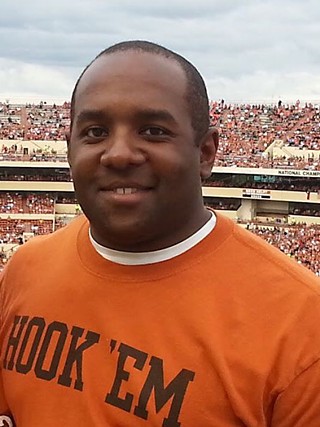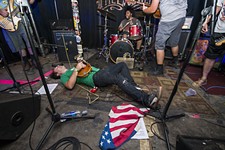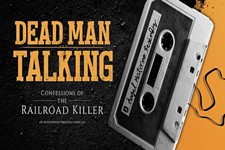No Prosecution for APD Officer
Freeman won't be charged in teen's death
By Chase Hoffberger, Fri., May 20, 2016
Recently terminated Austin Police Department Officer Geoffrey Freeman will not face criminal prosecution for the Feb. 8 shooting death of David Joseph. On May 17, a Travis County grand jury declined to issue an indictment against Freeman, who was indefinitely suspended (the civil service equivalent of being fired) for the shooting on March 21.
A press release from the Travis County District Attorney's Office indicates that the grand jury met on five separate days over a two-week span and heard testimony from 12 witnesses, including Freeman, members of Joseph's family, an APD training officer, "and a nationally known expert in police use of force." The D.A.'s Office also notes that the grand jury saw video footage from Freeman's patrol car, a second officer's dashboard camera, and a neighbor who filmed the officers' response on his iPhone immediately after the shooting. The D.A. made available to the press a variety of the evidence presented to the grand jury, including video of Freeman's interview with APD's Special Investigations Unit, the on-scene report made by Officer Roland Espinoza (the first officer to arrive on the scene after the shooting), and the SIU interview of Officer Enrique Flores, the training academy's firearms instructor whose training became a centerpiece of the post-shooting fallout (see "APA President Files Grievance," April 15). The D.A. also released a copy of the Medical Examiner's report and autopsy, which until now had not been made public.
The documents reveal that Freeman, an 11-year veteran at APD, thought Joseph, who was naked and standing in the middle of Nature's Bend in Northeast Austin when Freeman found him, was either "intoxicated and high" or suffering from "some type of mental illness." Freeman stated in his SIU interview that he believed that Joseph presented a public danger in the immediate moments before his death because calls concerning Joseph's hostile aggression had been made to APD earlier that morning, and because of how Joseph charged at him.
Jeff Edwards, the attorney for the Joseph family, issued a statement after the ruling: "Failing to secure an indictment when a police officer shoots and kills an unarmed, skinny, naked teenager, who the officer outweighed by over 100 pounds, is a failure of will by the district attorney, and calls into question the entire grand jury process in cases involving police misconduct. This is a sad day for justice." Joseph's brother Fally also offered comment: "Officer Freeman took David away from my family. He will never get to finish high school, go to college, have his own family, and take care of my mom like he always planned to."
As expected, the D.A.'s Office offered no insight into the grand jury's reasoning. Many have speculated that the officer's case may have been aided by Flores' SIU interview, if Flores said Freeman was acting in accordance with his training. But such a conclusion would directly contradict the determination made by Police Chief Art Acevedo, who found that Freeman violated departmental policies on Response to Resistance; Determining the Objective Reasonableness of Force; and Neglect of Duty. In a nine-page disciplinary memo, Acevedo wrote that "no one was under a threat of imminent harm of suffering serious bodily injury or death by Mr. Joseph," and that Freeman's use of deadly force was "unwarranted."
Ken Casaday, president of the Austin Police Association, told the Chronicle that he believes the grand jury may have decided that Freeman was following the training he'd received, and that he believed he was using a reasonable amount of force under the standard established by the Supreme Court in Graham v. Connor in 1989. Casaday issued a statement in response to the grand jury's decision: "The Travis County Grand Jury, a group with roots deep in this community, has recognized the dangers Ofc. Freeman faced on that day. They have concluded that it was a tragic incident, and Officer Freeman acted appropriately. We hope that the community can come together and have a productive dialogue about what could have been done to prevent this tragedy, rather than vilify this officer and the profession of policing."
Chas Moore, co-founder of the Austin Justice Coalition, questioned that. "I think Ken Casaday and the police union are the people we can't talk to. I was on national TV with the police chief talking to him. I can go outside right now and talk to a cop," he said. "But Ken Casaday has never said, 'Hey Chas, let's talk about some stuff.' I've talked to the mayor, City Council ... I've never talked to him. I find that slightly hypocritical that [now] he wants to talk."
Moore said that he was saddened, upset, and confused by the decision. "The police chief goes out on a limb and fires this guy because the chief feels that he violated multiple – not one or two – protocols and procedures," he said. "If the chief went out on a limb and said this killing was unjustified, I don't see why a jury of intelligent adults can't look at the facts of this case and say, 'Hey, maybe we should indict this guy and let a trial decide if he did something wrong.'"
Acevedo's actions following the shooting are now a major focal point. His decision to fire Freeman – and not just fire him, but to make the determination within a self-imposed 30-day deadline – has been championed by activists and hotly contested by the APA, which believes that Acevedo rushed to judgment in order to placate the community. Through his attorney, Freeman made clear before the termination was even issued that he planned to appeal any discipline. At present, an arbitration date has not been set. Speaking Tuesday, Casaday suggested that the non-indictment could help Freeman in his effort to win his job back. "It was a poor decision on [Acevedo's] part," Casaday said. "His entire police academy was against him on this and he went against the training of the police department that was provided by the police academy, which he runs. He went against the academy, which has created a huge amount of distrust in Chief Acevedo, and has caused horrible morale within the police department.
"He should have waited until the grand jury ruled [to make a decision]. And yet he yielded to a group of community activists and a few politicians who wanted to see this officer fired."
Acevedo declined to comment directly on Casaday's assertions. But in an April 19 memo to City Manager Marc Ott concerning his much-publicized discipline as a result of his back-and-forth with the training academy over use-of-force standards (see "Ott and Acevedo at Odds," May 6), the chief did speak indirectly to his motivations in dealing with Joseph's shooting: "One of my highest priorities as police chief is to provide clear, visible guidance and leadership to the police force in preparation for these situations and to lead the officers, their families, and community members through the aftermath."
Got something to say on the subject? Send a letter to the editor.









